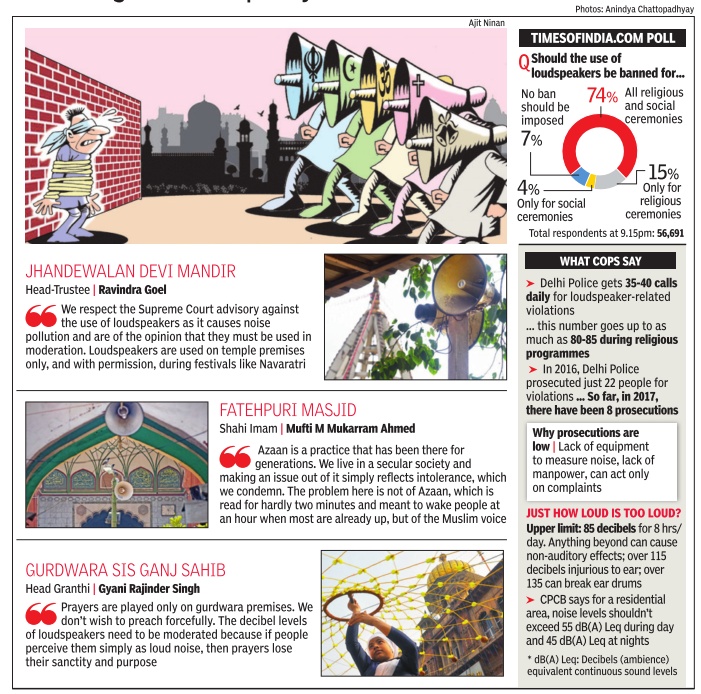Noise Pollution: India
(→Temple, mosque loudspeakers) |
(→Delhi: low enforcement) |
||
| Line 33: | Line 33: | ||
==Delhi: low enforcement== | ==Delhi: low enforcement== | ||
[http://epaperbeta.timesofindia.com/Article.aspx?eid=31808&articlexml=100-complaints-a-day-but-just-22-booked-20042017002049 Somreet Bhattacharya, 100 complaints a day but just 22 booked in a yr, April 20, 2017: The Times of India] | [http://epaperbeta.timesofindia.com/Article.aspx?eid=31808&articlexml=100-complaints-a-day-but-just-22-booked-20042017002049 Somreet Bhattacharya, 100 complaints a day but just 22 booked in a yr, April 20, 2017: The Times of India] | ||
| + | |||
| + | [[File: Loudspeakers for religion, social events, the position in Delhi, April 2017.jpg|Loudspeakers for religion, social events: the position in Delhi, April 2017; [http://epaperbeta.timesofindia.com/Gallery.aspx?id=20_04_2017_002_038_011&type=P&artUrl=Keep-the-faith-but-at-a-low-decibel-20042017002038&eid=31808 The Times of India], April 20, 2017|frame|500px]] | ||
Revision as of 08:33, 22 August 2017

This is a collection of articles archived for the excellence of their content. |
Contents |
The state-wise position
Delhi
The Times of India, June 9, 2016
Noise pollution is a killer too
The busy ITO junction in Delhi registers around 74 decibel (dB) of sound on a typical day , almost 10db over the limit for commercial areas. The level near Acworth Hospital in Mumbai's Wadala is usually 70dB, almost 20dB more than what's permitted in such a zone. Noise pollution is now linked to many ailments from irreversible hearing loss to anxiety attacks to hypertension and heart disease. Considering that every 10dB increase makes the sound twice as loud to the human ear, the health implications for a regular commuter are serious. The situation is so bad in cities that ENT specialists now say a 20dB loss in hearing among urbanites is “normal“.
That's the impact of the constant onslaught of noise on our ears, say experts.It's a subject on which there is limited research and little understanding.
“People don't realise that noise is the hidden enemy of man. It affects your en tire body , said Dr Yeshwant Oke, who brought noise pollution into the public consciousness when he filed the first noise pollution-related petition in the Bombay courts in 1985.
Sumaira Abdulali of Awaz Foundation echoes a similar sentiment: “People will adjust to living next to a railway station despite the disturbance caused by loud announcements and honking. Loud music is one of the leading cause of police complaints the world over, including India, but we never think too much about the harm of constant honking by cars on the roads just outside their house. Clearly , the main sources of noise in the main urban centres are vehicles,
Loudspeakers for religion, social events
Delhi: low enforcement

Noise annoys not only those living in areas where religious or social events such as weddings are organised, but also the cops.Police have to attend to 80-100 complaints about the use of high-decibel loudspeakers beyond the hours permitted.However, only a handful of violators are eventually booked: till date only eight individuals have been hauled up for violating the noise norms this year, while 22 were penalised in the whole of last year.
One-third of the complaints last year related to violations beyond midnight, another third to the post-1am period. In 2005, the Supreme Court permitted the use of loudspeakers till 10pm, while setting the limit for noise levels in residential areas at 55 decibels.
Of course, even the complaints logged with them comprise only a tenth of the actual violations, admit police.Most people stoically suffer the loud sound, especially if the occasion is religious or matrimonial.
“We do comply with the rule that all programmes have to stop after midnight,“ claimed Satish Manchanda, who runs a troupe that has been organising jagrans in central and east Delhi for two decades. “But,“ he added, “people seldom object to religious functions. There is a difference between decent songs and loud noise.“
Randeep Singh, a disc jockey and show conductor in a south Delhi event management firm, disclosed that the consoles they used actually have sound meters to monitor the output. “However, towards the end of the events, the organisers, especially of religious functions, demand loud music and we have to comply ,“ Singh said.
On regular days, police receive the most complaints from east and north-east Delhi. West Delhi tops the list in the festive season. Once a complaint call is logged, a PCR team or the local police reach the venue, but as a police officer shrugged, they can “only request the organisers to wind down“.
Delhi Police does have 15 noise meters, but these are deployed only in specific areas. Police officers also claimed that people almost always turn down the volume when they see the cops arriving and up the tempo after they leave.
The cops can book violators for noise pollution under the Environment Protection Act, where the minimum penalty for violation of any of its provision is an imprisonment for a term of five years or a fine of up to Rs 1 lakh, or both. If the offenders do not challenge the charges, they can get away by paying Rs 5,000.
Triyadan: Silent prayers
Nazar Abbas, Temples and mosques go mute in Rampur, June 4, 2017: The Times of India
In show of communal amity , Hindus agreed to remove loudspeaker from temples and Muslims from mosques in a restive Moradabad village. According to police officials, tension was simmering in the village for the past three years over loudspeakers at temples and mosques.
Circle officer (rural) Chakramani Tripathi said, “Police and district administration of Moradabad are full of praise for the initiative taken by the elders of both the communities who amicably resolved the issue in the holy month of Ramzan.“
Triyadan village under the jurisdiction of Bhagatapur police station here has been in news for recurring communal violence over the use of loudspeakers on places of worship of both the communities .